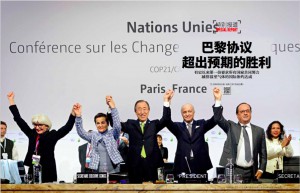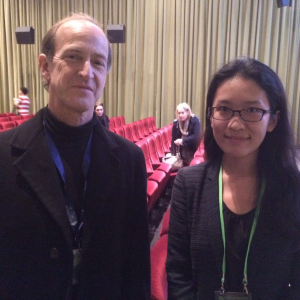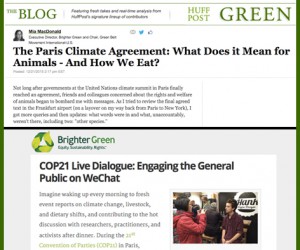
COP21
Brighter Green’s Executive Director Mia MacDonald and Associate Wanqing Zhou attended and participated in the 2015 United Nations Climate Change Conference, COP21 in Paris, France. We shared our work on the globalization of industrialized animal agriculture, our short documentary What’s For Dinner?, and released Wanqing’s discussion paper The Triangle.
We showed a looping DVD of all of Brighter Green’s country videos—as well as the full version of What’s For Dinner?—at our exhibit space, and shared our various policy documents. Our shared space (with Global Forest Coalition and Humane Society International) was conveniently located next to a cafe area of the exhibit hall, so we received a good amount of traffic:
For more in-depth coverage of how we participated, contributed, and were covered by the media, click the links below.
Media Coverage
Side Events – Partnered
Side Events – Attended
Conference Analysis
More Photos

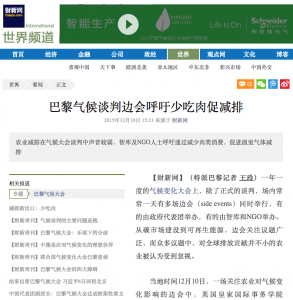 Caixin journalist Ling Wang (王玲) reported on Brighter Green’s side event co-organized with Chatham House, Humane Society International and EAT Initiative on Wednesday December 9. The article quoted Mia MacDonald on why agriculture and meat consumption have been neglected in the climate negotiation, and included Wanqing Zhou’s opinion on China’s nutrition development goals. It also introduced What’s For Dinner?, Brighter Green’s documentary on China’s meat production and consumption. Most of the comments under the online article reflect a higher awareness of these issues. For example:
Caixin journalist Ling Wang (王玲) reported on Brighter Green’s side event co-organized with Chatham House, Humane Society International and EAT Initiative on Wednesday December 9. The article quoted Mia MacDonald on why agriculture and meat consumption have been neglected in the climate negotiation, and included Wanqing Zhou’s opinion on China’s nutrition development goals. It also introduced What’s For Dinner?, Brighter Green’s documentary on China’s meat production and consumption. Most of the comments under the online article reflect a higher awareness of these issues. For example:
“The connection is real; it’s like calling for green commuting and energy saving.”
“More veggie, less meat.”
“We truly need to reduce meat consumption.”
Ling Wang also wrote a longer report on the Paris COP negotiations for Caixin Weekly’s December 21, 2015 issue. In the first article of the report, she mentions Mia and Brighter Green’s work to raise awareness about the huge amount of greenhouse gas emissions caused by the global livestock industry.
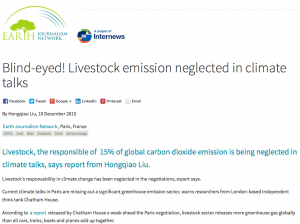
Hongqiao Liu from Earth Journalism Network also posted an article on the role of livestock in climate change, and Wanqing was quoted about China’s position on industrialized animal farming.
STAY TUNED: More media coverage from CBC News and Agence France-Presse coming soon!

Meat: The Big Omission from the Talks on Emissions
December 9th, 3:00 PM – 4:30 PM
Observer Room 04, Le Bourget Conference Center (Parc des Expositions)
Speakers: Johan Rockström, EAT (Chair), Antony Froggatt, Chatham House, Jo Leinen, Member of the European Parliament, Alexandra Clark, Humane Society International, and Wanqing Zhou, Brighter Green
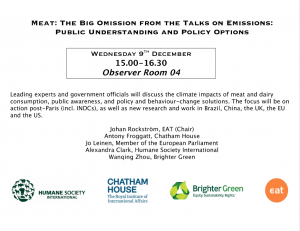
If one of the biggest contributors to climate change is meat and dairy production, why doesn’t it take a more central position in our strategy to combat global warming? Brighter Green partners with Chatham House and the Humane Society International to address how to highlight and continue to address this global challenge post-Paris. Associate Wanqing Zhou will present her new discussion paper, The Triangle, which explores the “triangle of factory farming” linking the world’s three biggest players in the meat industry (the U.S., China, and Brazil) as well as the dynamics shaping this triangle (historical and current). She will also discuss Brighter Green’s ongoing work in China, organized around its documentary film What’s For Dinner?, and suggest relevant policy and public education measures post-COP21.
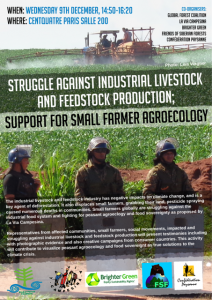 Unsustainable Meat: The Impacts of Industrial Livestock and Feedstock Production on Climate and the People
Unsustainable Meat: The Impacts of Industrial Livestock and Feedstock Production on Climate and the People
December 9th, 2:50 PM – 4:20 PM, Centquatre Paris
What is environmental racism and how does industrial livestock and feedstock production perpetuate it? In this discussion, Brighter Green partnered with the Global Forest Coalition and presented our work pertaining to the globalization of factory farming in Brazil, China, Ethiopia, and India as well as the industrialization of dairy in Asia.
 The Global Livestock Sector: Environmental, Social, Cultural, and Health Impacts
The Global Livestock Sector: Environmental, Social, Cultural, and Health Impacts
December 10th, 10.00 AM – 11.30 AM
The Netherlands Climate Pavilion COP21 Paris
When we think about climate change, not only do we consider the environmental implications of global warming, but also its social, cultural, and health consequences. In this panel, Brighter Green, the Global Forest Coalition, CEIDRA, and Friends of the Siberian Forests addressed the myriad of ways that the global livestock sector affects the globe—as well as how agroecology and food sovereignty can mitigate the climate crisis.

Mia MacDonald is interviewed in the new climate change documentary, Time to Choose, directed by Charles Ferguson (Academy award-winning director of Inside Job and No End in Sight). Time to Choose screened twice during the COP in Paris:
CINE-CLIMAT Time to Choose directed by Charles Ferguson + Debate
December 5th, 6:00 PM, Grand Palais, Paris
This event featured director Charles Ferguson, activist Jane Goodall, and California governor Jerry Brown.
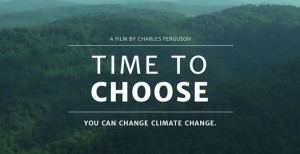
Time to Choose screening #2
December 10th, 4:30 PM – 6:35 PM, Climate Generations Area, Le Bourget Conference Center (Parc des Expositions)
This screening was part of the climate change film festival at the COP’s official civil society space. We were pleased to learn the cinema venue at Climate Generations is named in honor of Wangari Maathai, the late Nobel peace laureate, pioneering environmentalist, and Brighter Green advisory board member.

Mia MacDonald wrote a blog for Huffington Post where she analyzes the final conference agreement, both what is included and, more importantly, what is left out. You can find the article here.
Wanqing Zhou also reflected on COP21 in a Brighter Green blog entry. She talks about her work in Paris connecting the negotiations and related events to people in China via WeChat, as well as summarizing some of the events. You can read her full report here.
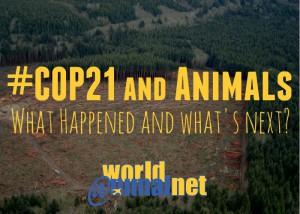 World Animal Net’s senior policy and legal resource advisor, Akisha Townsend Eaton wrote about the conference for the organization’s blog. She included Brighter Green’s December 9th side event in her analysis.
World Animal Net’s senior policy and legal resource advisor, Akisha Townsend Eaton wrote about the conference for the organization’s blog. She included Brighter Green’s December 9th side event in her analysis.
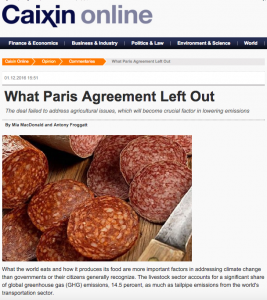 In late December 2015, Mia co-wrote an article with Chatham House’s Antony Froggatt published on Caixin International (Chinese here, English here). The op-ed discusses the role of animal agriculture in climate change, the outcomes of the COP with regard to this, and how it should be addressed in the post-Paris era. It explores and suggests steps that industry, both in China and globally, could take to create and ensure
In late December 2015, Mia co-wrote an article with Chatham House’s Antony Froggatt published on Caixin International (Chinese here, English here). The op-ed discusses the role of animal agriculture in climate change, the outcomes of the COP with regard to this, and how it should be addressed in the post-Paris era. It explores and suggests steps that industry, both in China and globally, could take to create and ensure 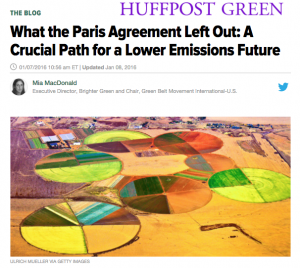 more sustainable and climate-resilient agricultural systems. The article was re-published in Huffington Post in early 2016, as well as in Green Society and VUS Times.
more sustainable and climate-resilient agricultural systems. The article was re-published in Huffington Post in early 2016, as well as in Green Society and VUS Times.

Photos coming soon.
 Brighter Green
Brighter Green




